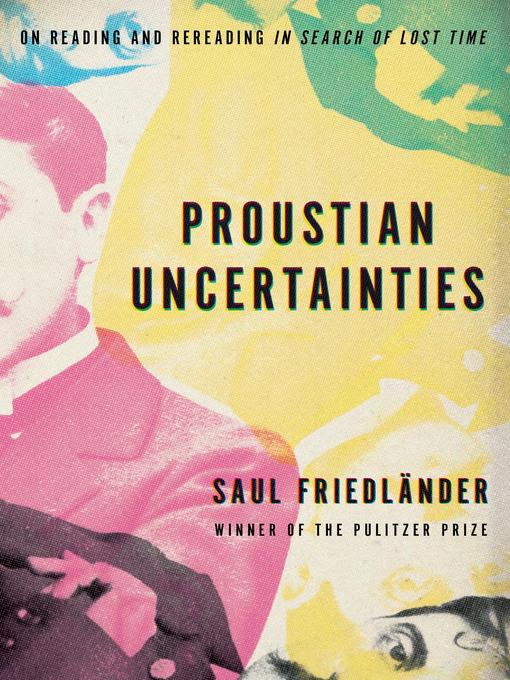
Proustian Uncertainties
On Reading and Rereading In Search of Lost Time
- اطلاعات
- نقد و بررسی
- دیدگاه کاربران
نقد و بررسی

August 3, 2020
Pulitzer-winning Holocaust historian Friedländer (The Years of Extermination) meditates on the “extraordinary pull” and hidden depths of Marcel Proust’s À la recherche du temps perdu in this intriguing extended essay. Making no claim to be a Proust specialist, Friedländer is less interested in the novel as a piece of literature than as a personal document of Proust’s secretive and complex personality. He explores how the “strange, contradictory statements” of the book’s narrator reflect “the voice of the author’s unconscious,” especially regarding Jewish identity (to which Proust had a conflicted relationship), his sexuality as a gay man, and Proust’s fascination with cruelty, which Friedländer finds “all-pervasive and depicted from all possible angles” in Proust’s work. Admiration for the complex “social tapestry” of the novel and Proust’s “sumptuous” style permeate Friedländer’s musings on the novel’s exploration of memory, death, the “invisible presence” of time, and unrequited love (the last theme inspired by, Friedländer speculates, Proust’s unfulfilled attraction to his driver, Alfred Agostinelli). Proust fans will enjoy these appreciative, personal peregrinations through “one of the most important novels ever written.” Agent: Georges Borchardt, Georges Borchardt, Inc.

September 1, 2020
Pulitzer Prize-winning historian Friedl�nder (history, Univ. of California Los Angeles; The Years of Extermination: Nazi Germany and the Jews, 1939-1945) pivoted from history to the literary with a biography of the brief life of Franz Kafka in 2013. Now, in this personal and idiosyncratic reading of Marcel Proust's In Search of Lost Time, the author intends "not to figure out solely what the Narrator means, but to investigate what he seems to mean or hide." Employing this rather delphic approach, Friedl�nder is determined to show that Proust, through the voice of the Narrator, is at pains to disguise or disavow in art what he could not in life--his and his mother's Jewish identity and his homosexuality. However, the novel will not cooperate. The Narrator's persistent contradiction, equivocation, and ambiguity (all vulnerabilities of remembrance) lead Friedl�nder to commit serial inference, overconfident speculation, and strained interpretations of the text, and thus he and his readers are left with a conclusion that bears the title of this book. VERDICT At 87, Friedl�nder's perseverance in rereading Proust and his reputation are impressive and will certainly draw in a curious literary readership.--Lonnie Weatherby, McGill Univ. Lib., Montreal
Copyright 2020 Library Journal, LLC Used with permission.

October 1, 2020
A book-length essay on Proust's masterpiece. Early on, Pulitzer Prize-winning historian Friedl�nder writes that he believes In Search of Lost Time is not only the greatest novel of French literature, but one of the most important novels ever written." In this brief, thought-provoking examination that is likely to appeal most to literary scholars he focuses on the "Narrator's strange, contradictory statements" and how the Narrator functions as Proust's "alter ego." The Narrator is a "disembodied presence unlike that in any novel before," and Friedl�nder engages in a close reading of the book to "decipher the author's strategy." His extensive quoting from the novel and his many debates with other Proust scholars create something of a running dialogue among many voices. After assessing the Narrator's love-hate relationship with his mother and Proust's own deep love for his, Friedl�nder takes on the book's puzzling treatment of Jews. Proust was Jewish; his Narrator is not. The Narrator's attitudes toward Jews are "often negative," and the novel is "replete with anti-Semitic remarks adopted by the Narrator without any comment." Friedl�nder notes the importance of understanding the Narrator's "obsession with the Jewish question in general and his own identity in particular," and even though the Narrator never "admits to even a whiff of homosexuality," it, too, plays a key role in the novel. Most of all, In Search is a "social satire on the grandest scale and an incomparable analysis of complex emotional constructs, but it mostly lacks a sense of tragedy." A "paean to memory," it's very much a "novel about time, but with a twist: it is directed toward the future...in order to recapture the past." It's "not Proust's story that we follow," Friedl�nder writes, "but that of his Narrator." The author is a wise, enthusiastic guide to Proust, but this one is mostly for the academic audience. An intimate literary investigation; those seeking a broader assessment will need to look elsewhere.
COPYRIGHT(2020) Kirkus Reviews, ALL RIGHTS RESERVED.




دیدگاه کاربران